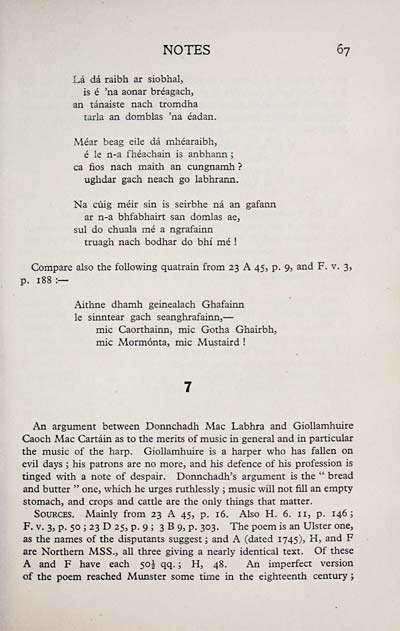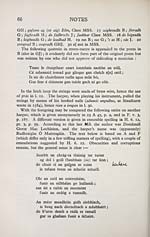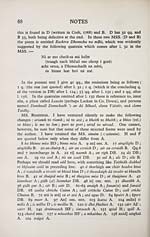Download files
Complete book:
Individual page:
Thumbnail gallery: Grid view | List view

NOTES 67
Lá dá raibh ar siobhal,
is é 'na aonar bréagach,
an tánaiste nach tromdha
tarla an domblas 'na éadan.
Méar beag eile dá mhéaraibh,
é le n-a f héachain is anbhann ;
ca fios nach maith an cttngnanih ?
ughdar gach neach go labhrann.
Na cúig méir sin is seirbhe ná an gafann
ar n-a bhfabhairt san domlas ae,
sul do chuala mé a ngrafainn
truagh nach bodhar do bhí mé !
Compare also the following quatrain from 23 A 45, p. 9, and F.
p. 188 :—
Aithne dhamh geinealach Ghafainn
le siimtear gach seanghrafaiim, —
mic Caorthainn, mic Gotha Ghairbh,
mic Mormónta, mic Mustaird !
An argument between Donnchadh Mac Labhra and Giollamhuire
Caoch Mac Cartáin as to the merits of music in general and in particular
the music of the harp. Giollamhuire is a harper who has fallen on
evil days ; his patrons are no more, and his defence of his profession is
tinged with a note of despair. Donnchadh's argument is the " bread
and butter " one, which he urges ruthlessly ; music will not fill an empty
stomach, and crops and cattle are the only things that matter.
Sources. Mainly from 23 A 45, p. 16. Also H. 6. 11, p. 146;
F. V. 3, p. 50 ; 23 D 25, p. 9 ; 3 B 9, p. 303. The poem is an Ulster one,
as the names of the disputants suggest ; and A (dated 1745), H, and F
are Northern MSS., all three giving a nearly identical text. Of these
A and F have each 50^ qq. ; H, 48. An imperfect version
of the poem reached Munster some time in the eighteenth century ;
Lá dá raibh ar siobhal,
is é 'na aonar bréagach,
an tánaiste nach tromdha
tarla an domblas 'na éadan.
Méar beag eile dá mhéaraibh,
é le n-a f héachain is anbhann ;
ca fios nach maith an cttngnanih ?
ughdar gach neach go labhrann.
Na cúig méir sin is seirbhe ná an gafann
ar n-a bhfabhairt san domlas ae,
sul do chuala mé a ngrafainn
truagh nach bodhar do bhí mé !
Compare also the following quatrain from 23 A 45, p. 9, and F.
p. 188 :—
Aithne dhamh geinealach Ghafainn
le siimtear gach seanghrafaiim, —
mic Caorthainn, mic Gotha Ghairbh,
mic Mormónta, mic Mustaird !
An argument between Donnchadh Mac Labhra and Giollamhuire
Caoch Mac Cartáin as to the merits of music in general and in particular
the music of the harp. Giollamhuire is a harper who has fallen on
evil days ; his patrons are no more, and his defence of his profession is
tinged with a note of despair. Donnchadh's argument is the " bread
and butter " one, which he urges ruthlessly ; music will not fill an empty
stomach, and crops and cattle are the only things that matter.
Sources. Mainly from 23 A 45, p. 16. Also H. 6. 11, p. 146;
F. V. 3, p. 50 ; 23 D 25, p. 9 ; 3 B 9, p. 303. The poem is an Ulster one,
as the names of the disputants suggest ; and A (dated 1745), H, and F
are Northern MSS., all three giving a nearly identical text. Of these
A and F have each 50^ qq. ; H, 48. An imperfect version
of the poem reached Munster some time in the eighteenth century ;
Set display mode to: Large image | Transcription
Images and transcriptions on this page, including medium image downloads, may be used under the Creative Commons Attribution 4.0 International Licence unless otherwise stated. ![]()
| Early Gaelic Book Collections > Matheson Collection > Measgra dánta > (81) |
|---|
| Permanent URL | https://digital.nls.uk/80517607 |
|---|
| Description | Items from a collection of 170 volumes relating to Gaelic matters. Mainly philological works in the Celtic and some non-Celtic languages. Some books extensively annotated by Angus Matheson, the first Professor of Celtic at Glasgow University. |
|---|
| Description | Selected items from five 'Special and Named Printed Collections'. Includes books in Gaelic and other Celtic languages, works about the Gaels, their languages, literature, culture and history. |
|---|

